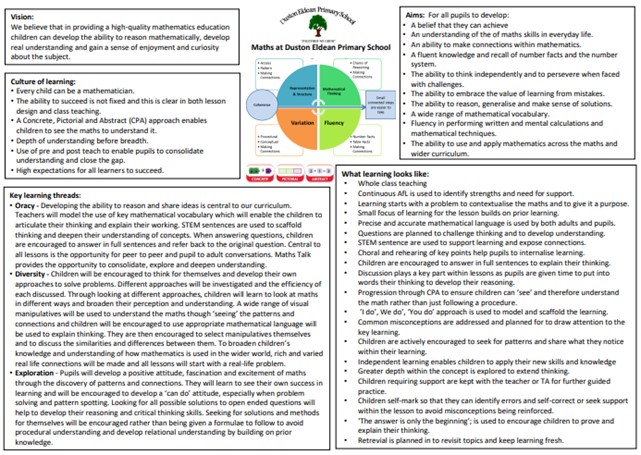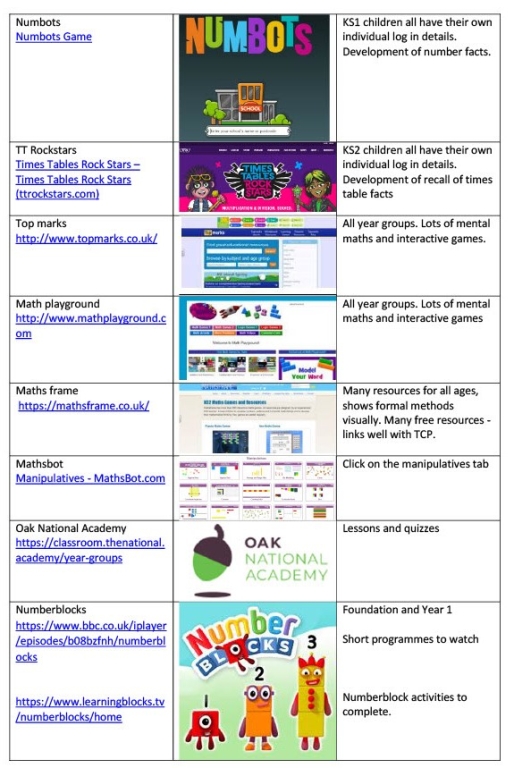INTENT
Vision
We believe that in providing a high-quality mathematics education children can develop the ability to reason mathematically, develop real understanding and gain a sense of enjoyment and curiosity about the subject.
Culture of learning:
- Every child can be a mathematician.
- The ability to succeed is not fixed and this is clear in both lesson design and class teaching.
- A Concrete, Pictorial and Abstract (CPA) approach enables children to see the maths to understand it.
- Depth of understanding before breadth.
- Use of pre and post teach to enable pupils to consolidate understanding and close the gap.
- High expectations for all learners to succeed.
Aims
- Instil a positive mind-set that everyone can do maths and that maths is for everyone and a belief that they can achieve.
- Deliver an inspiring and engaging mathematics curriculum, taught by highly-enthusiastic staff, which sparks curiosity and excitement and which nurtures confidence in maths.
- Develop children’s ability to articulate, discuss and explain their thinking using appropriate mathematical vocabulary.
- Build a deep conceptual understanding of maths and its interrelated content so that children can apply their learning in different situations.
- Provide ‘Mistake friendly’ classrooms where children embrace the value of learning from mistakes.
- Encourage children to look for patterns and make connections within mathematics.
- Develop a fluent knowledge and recall of number facts and the number system.
- Develop the ability to think independently and to persevere when faced with challenges.
- Develop the ability to reason, generalise and make sense of solutions.
- Create fluency in performing written and mental calculations and mathematical techniques.
- Build the ability to use and apply mathematics across the maths and wider curriculum.
- Develop an understanding of the of maths skills in everyday life.
- Create confident, competent and independent mathematicians.
Key threads in Maths
|
Whole School curriculum vision in Maths | |
|---|---|
|
Oracy |
Developing the ability to reason and share ideas is central to our curriculum. Teachers will model the use of key mathematical vocabulary which will enable the children to articulate their thinking and explain their working. STEM sentences are used to scaffold thinking and deepen their understanding of concepts. When answering questions, children are encouraged to answer in full sentences and refer back to the original question. Central to all lessons is the opportunity for peer to peer and pupil to adult conversations. Maths Talk provides the opportunity to consolidate, explore and deepen understanding. |
|
Diversity |
Children will be encouraged to think for themselves and develop their own approaches to solve problems. Different approaches will be investigated and the efficiency of each discussed. Through looking at different approaches, children will learn to look at maths in different ways and broaden their perception and understanding. A wide range of visual manipulatives will be used to understand the maths though ‘seeing’ the patterns and connections and children will be encouraged to use appropriate mathematical language will be used to explain thinking. They are then encouraged to select manipulatives themselves and to discuss the similarities and differences between them. To broaden children’s knowledge and understanding of how mathematics is used in the wider world, rich and varied real life connections will be made and all lessons will start with a real-life problem. |
|
Exploration |
Pupils will develop a positive attitude, fascination and excitement of maths through the discovery of patterns and connections. They will learn to see their own success in learning and will be encouraged to develop a ‘can do’ attitude, especially when problem solving and pattern spotting. Looking for all possible solutions to open ended questions will help to develop their reasoning and critical thinking skills. Seeking for solutions and methods for themselves will be encouraged rather than being given a formulae to follow to avoid procedural understanding and develop relational understanding by building on prior knowledge. |
IMPLEMENTATION
Our Maths Curriculum
We follow a Teaching for Mastery Approach across the school where all children are encouraged to become mathematically observant and to think mathematically. We believe that every child can be a mathematician and have high expectations for all.
Whole class teaching, through carefully structured, coherent, small steps, help all children to build self-confidence and be successful in their learning. We aim for depth of understanding so that skills and knowledge can be applied fluently therefore teachers ensure children master the content before moving on.
An ‘I do’, We do’, ‘You do’ approach is used to model and scaffold the learning. Continuous AfL is used to identify children requiring support who are kept with the teacher or TA for further guided practice enabling children to keep up.
Questions are planned to challenge thinking and to develop understanding. Common misconceptions are addressed and planned for in order to draw attention to the key learning. Choral and rehearing of key points help pupils to internalise learning.
Carefully planned use of representations are used to expose mathematical structures. A Concrete, Pictorial and Abstract (CPA) approach enables children to see the maths to understand it. Carefully scaffolded learning enables connections to be made and relational understanding to be mastered by all.
Paired talk is an essential part of all lessons as children are encouraged to develop their thinking and reasoning using appropriate mathematical vocabulary. STEM sentences are used to support learning and expose connections. Children are actively encouraged to seek for patterns and share what they notice within their learning and answer in full sentences. ‘The answer is only the beginning’ is used to encourage children to prove and explain their thinking.
Independent learning enables children to apply their new skills and knowledge. Children self-mark so that they can identify errors and self-correct or seek support within the lesson to avoid misconceptions being reinforced.
Problem solving is integrated into lessons through real life word problems and open investigations which encourage children to reason about the skills and knowledge needed and the methods of working they will apply.
Retrieval is also a key part of our learning and time is given to revisit previously taught topics to help strengthen the connections in the brain. Additional practice helps to develop fluency
Planning:
Long Term Plans plot the sequence of learning throughout the year.
• Priorities for learning (from the Mathematics Guidance document) are identified for each term.
Medium Term Plans identify the sequence of learning for each unit of work:
• picking out the small coherent step.
• identifying and planning for misconceptions.
• identifying key mathematical vocabulary.
• planning in specific representations and structures.
Daily lessons:
• build on from what has previously been taught.
• focus on one small step.
• identify the key questions to develop understanding
IMPACT
What is the impact of our curriculum?
Our approach leads to happy, well-rounded Mathematicians, who enjoy learning, are confident mathematicians and ready for the next step in their educational journey.
- Children are happy learners who talk enthusiastically about their learning and have a positive view of maths.
- Children are confident to ‘have a go’ and know that it is reasonable to make mistakes and this can strengthen their learning and deepen understanding.
- Children are able to spot patterns and see connections.
- Children are able to articulate their understanding clearly using appropriate mathematical language.
- Teachers are able to pick up on misconceptions and support learners enabling children to keep up.
- Children are able to think flexibly to select appropriate methods and strategies that are efficient.
- Children are fluent mathematicians who can recall and apply knowledge independently.
- Children can reason and solve problems by using prior learning.
These factors ensure that we are able to achieve high standards:
Year 4 Multiplication Check: 33% of pupils achieving full marks, mean average score 22.2
Key stage 2 attainment of the expected standard in mathematics 97%
Key stage 2 attainment of greater depth in mathematics 43%
Maths Policies
| Title | Download |
|---|---|
| pdf Rosenshine and TfM Primary | Download |
Fluency
In addition to the daily maths lesson, we also provide additional practice of key number skills through fluency sessions. These sessions help to secure with the fundamental workings of the number system, so that they are able to flexibly and efficiently apply their number skills to other areas of maths.
Rapid recall of times table facts is a key skill that children need to access a large proportion of the Year 5 and 6 curriculum. In order to develop recall of facts, a number of strategies are used including rolling numbers, where children learn to count fluently in steps of a given number. We aim for all children to have instant recall of all facts up to 12 x 12 by the end of Year 4.
Partnership with parents/carers
We welcome the opportunity to work in partnership with parents/careers to provide a supportive and encouraging experience for our pupils.
Maths Buzz Bingo
There are many essential life skills that are developed though our maths curriculum. We provide further time and opportunity to develop and practice these skills through our Maths Buzz Bingo challenges that are set 3 times a year. Children have up to 6 challenges to complete at home, with the support of an adult, to develop proficiency in these skills that will be essential in later life.
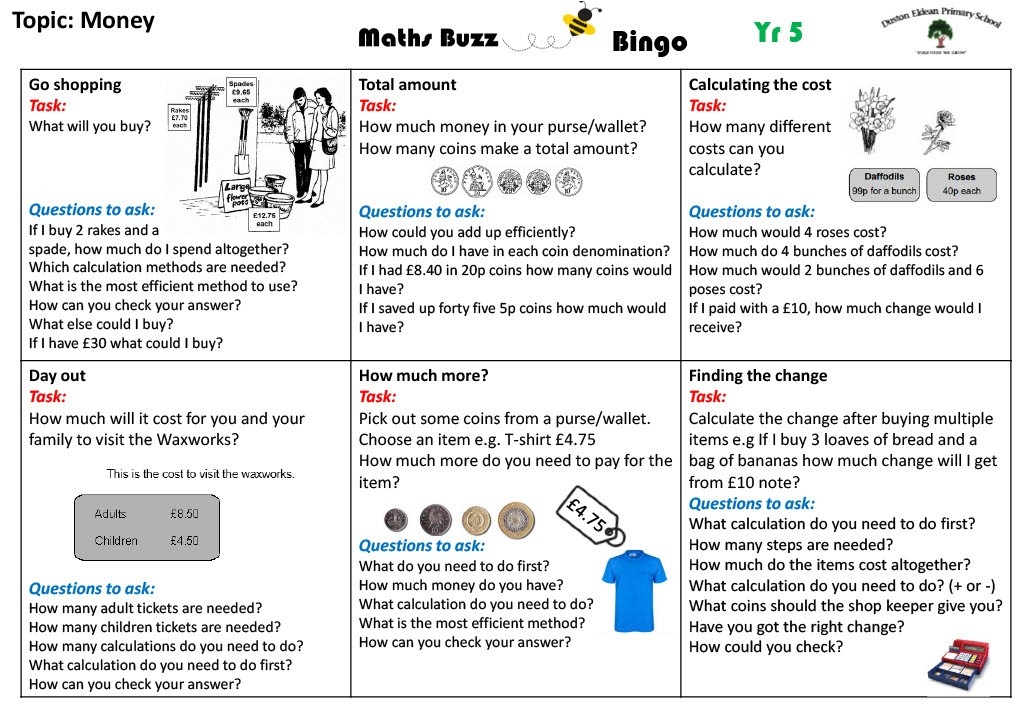
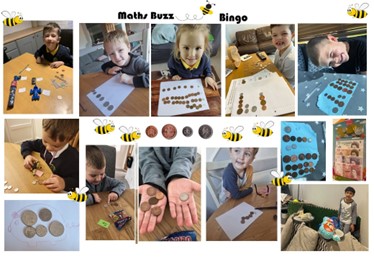
Fluency workshops
Annual KS1 parent workshops invite parents into school to complete a range of fun games and challenges with their child to develop an understanding of the mastering number skills that are being developed in school. A five-week homework challenge is then set up for parent/carers to play games at home to support the work in school aimed at developing fluency of number sense.
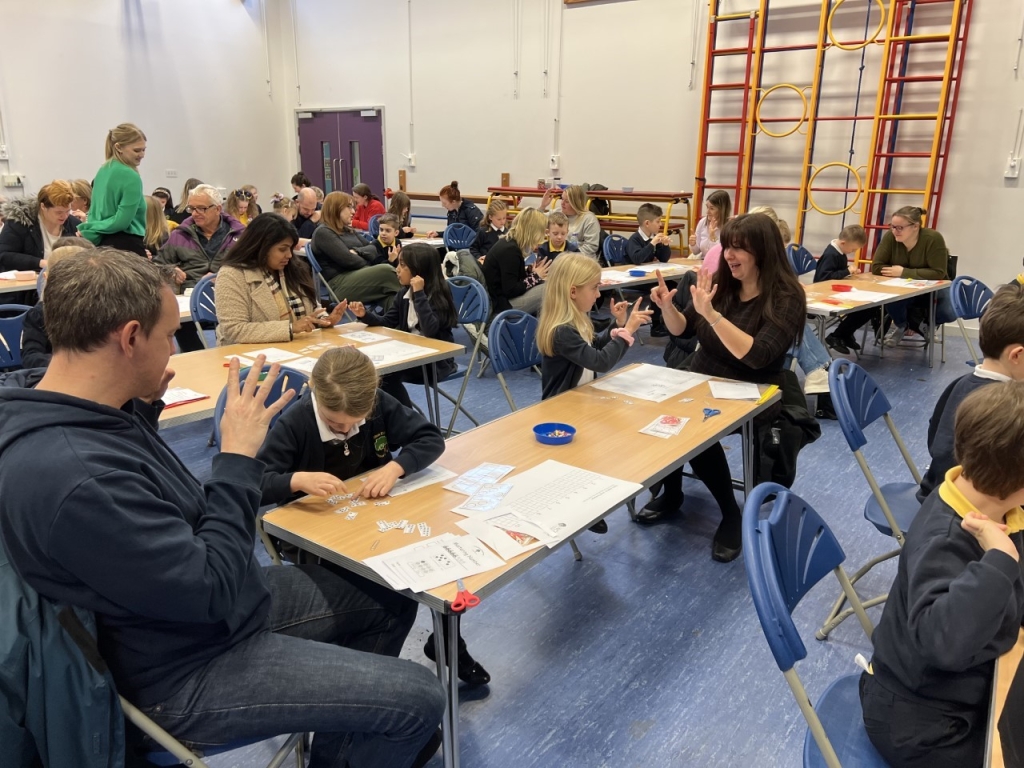
Our own experiences of maths may not have been positive in school but the way we now teach maths is to enable all children to be successful. We therefore need to be careful how we speak about maths to ensure that we develop positive attitudes in maths for our children.
Useful Websites for Parents
There are many great websites that can support children with their maths. We subscribe to Numbots for Key Stage 1 and TT Rockstars for Key Stage 2 pupils as we believe developing these number skills are essential in providing firm foundations for other maths. Each pupil has their own log in details so please ask the class teacher if you do not have these to hand.
